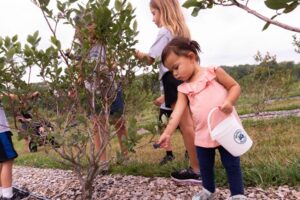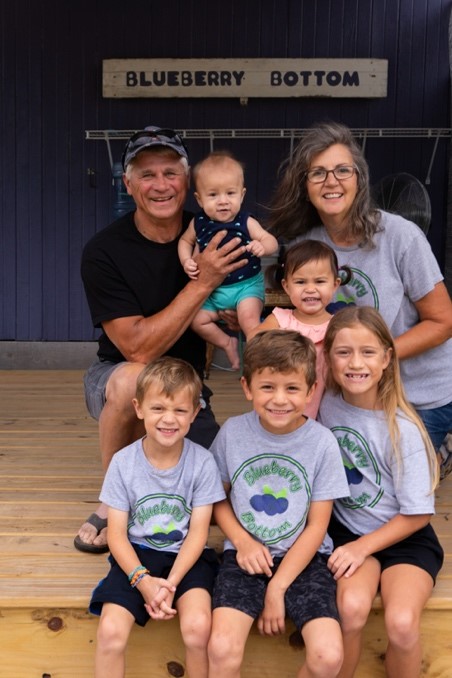Two-Time Cancer Survivor, Kim Andersen Runs the Only Certified Organic You-Pick Blueberry Farm in Iowa

Kim Andersen is on a bit of an island: a blueberry island. More specifically, she runs the only certified organic you-pick blueberry farm in Iowa and often feels like the odd-woman out. But after surviving cancer twice, producing these healthy and delicious berries without harsh chemical exposure was important enough to her to pave her own way. Though her husband and farming partner was initially skeptical about going organic, he’s sold on it after seeing the changes to their soil. They now bask in the ability for all types of people to come to pick directly off their blueberry rows.
 “I built it as a U-Pick operation because I wanted little kids to come here and see that blueberries do not just come from that plastic clamshell in the store, they come from a bush.”
“I built it as a U-Pick operation because I wanted little kids to come here and see that blueberries do not just come from that plastic clamshell in the store, they come from a bush.”
Since coming back to her multi-generational family farmland, Kim and her husband have built a diverse, unique farming operation that is highly visible to their community and relies on a mixture of row crops, perennials, timber, and orchard crops to stay resilient.  Around 40 acres of their 400+ acres have been in Kim’s family since 1894, after her great-great-grandfather and his brothers came from Switzerland in search of land to produce dairy on.
Around 40 acres of their 400+ acres have been in Kim’s family since 1894, after her great-great-grandfather and his brothers came from Switzerland in search of land to produce dairy on.
“My dad hated the farm, he left in a fast car and never came back. And then you get back to me who never even dreamed of it. . .But I had cancer in my 30s and again in my 40s. When I got sick that second time, we came back to the farm. I started to question everything in my environment, including household cleaners. I started asking questions of our tenant about what he was doing in terms of spraying and was surprised that he was not fully aware of the fertility and chemicals being used on our farm. So that led me to have deep discussions with my brothers about how our land was being farmed.”
As a former educator, she has leaned on her penchant for independent learning and research to support her team in paving their own way as blueberry producers in Iowa. It’s a role she embraces, but sometimes, this autonomous spirit presents challenges that go beyond feeling isolated. One of the more challenging learning curves she’s experienced is happening now due to the recent and increasingly recurring drought.
“Our water source is a well and it wasn’t keeping up. The type of irrigation I need is not common in Iowa. I’ve been talking to folks in Michigan where they grow more blueberries. But it’s hard to find information from somebody who’s not trying to sell you something.”
 With support from AFT’s Brighter Future Fund, she was able to purchase two new holding tanks to supplement their well and allow for more consistent flow. But this is nowhere near enough, so Kim is leaning on the diversity they have in their operation to stay resilient. She’s particularly interested in the potential to cultivate perennial grains such as Kernza, and other longer-term crops as part of the mindset she’s honed with the blueberry production.
With support from AFT’s Brighter Future Fund, she was able to purchase two new holding tanks to supplement their well and allow for more consistent flow. But this is nowhere near enough, so Kim is leaning on the diversity they have in their operation to stay resilient. She’s particularly interested in the potential to cultivate perennial grains such as Kernza, and other longer-term crops as part of the mindset she’s honed with the blueberry production.
“With a perennial crop like blueberries it takes time and patience especially. Those are big deterrents for some people. But we were willing to make that commitment and that’s part of being resilient is thinking long term.”
 That long-term mindset also applies to their care for their soil. She recognizes that this can be a difficult investment to make for her neighboring farms. It was for them in the beginning, too. But the proof is in the progress they’ve seen over years of operating with soil health principles in mind. They’ve started to see protecting their soil as synonymous with protecting their farm.
That long-term mindset also applies to their care for their soil. She recognizes that this can be a difficult investment to make for her neighboring farms. It was for them in the beginning, too. But the proof is in the progress they’ve seen over years of operating with soil health principles in mind. They’ve started to see protecting their soil as synonymous with protecting their farm.
“Things that are a winner for your soil aren’t always a winner for your books. Oh, but the soil! It’s so mellow after you do these practices. It’s really cool to see. . .When we started with our no till chemical farmer, we’d drive around and see such horrible erosion. If you took a spade, it was just dead dirt. Now if I get out there and dig it’s not dead anymore it’s nice! . . . Since we started farming organically, we haven’t seen erosion like we did when we farmed no till conventional.”
Under Kim and her husband’s stewardship, they have installed grass waterways that reduce erosion, put their wetland into a conservation easement, and prioritized diversity wherever possible on their cropland. Kim’s operation is never dormant: she is always researching, tinkering, calculating, and re-calculating her farm’s impact and what she can do differently. Her attention to detail has even motivated some of her neighbors to transition to organic.
Beyond modeling unique farming practices for their community, Kim is paving the way for young people, especially women, to enter agriculture through the team she hires on her farm. Situated amid an Amish community, Kim has faced some issues as a woman-led farm in finding ways to interact effectively across different cultural expectations of gender. One way she’s found to be effective is by leaning on the young women in this community as part of her labor force.  Kim hires and works closely alongside these young women in her fields throughout the season and creates a sense of community and deeper engagement with the farm, celebrating their birthdays and hosting end-of-season parties each year. Having had powerful women in her life when she was young, she tries to fill a similar mentorship role for her young employees, as they need. She sees this as part of her and her farm’s legacy.
Kim hires and works closely alongside these young women in her fields throughout the season and creates a sense of community and deeper engagement with the farm, celebrating their birthdays and hosting end-of-season parties each year. Having had powerful women in her life when she was young, she tries to fill a similar mentorship role for her young employees, as they need. She sees this as part of her and her farm’s legacy.
“I really want to pass on what we’ve built to someone who will really appreciate it. We don’t care if it’s a family member, we just want it to be someone who loves this place.”
Kim has sought out community learning through university extension offices, blueberry farmers across the country, and local farmer networks like Practical Farmers of Iowa (SFI), the Iowa Organic Association, and the Women, Food, and Agriculture Network (WFAN). Being able to carve out supportive spaces that center women’s voices in agriculture has helped Kim feel supported in her work and has created pockets of community where she can see herself represented in agriculture.
“Being on the Iowa Organic Association board has been big, some really influential women, including Denise O’Brien and Margaret Smith, are on the board and have become awesome resources and encouragers… The WFAN conference (Denise is a founder of WFAN) was really powerful for me to attend with all women because it’s not what I typically experienced coming into this field myself.”
Kim’s operation may be unique, but it is influential, and she knows it. Being situated along a highway, Kim recognized early on that their farm has a unique opportunity to educate and model what resilience can really look like. With their public-facing model, Kim and her farming partners invite others along for the journey to create that more healthy and resilient future, one blueberry-stained hand at a time.
WFAN and AFT’s Women for the Land program are jointly organizing women-centered events for Iowa producers in the Fall of 2023. If you are interested in participating in these events contact amie@wfan.org.

